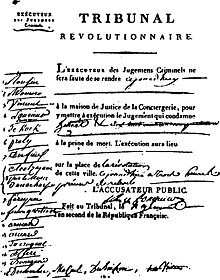Hébertists
The Hébertists (fr. Hébertistes ) were a grouping of anti-clerical and social revolutionary Cordeliers during the French Revolution . The term not used itself (but in historiography) goes back to its most famous representative, the publicist Jacques-René Hébert .
The Hébertists represented a loose, albeit influential, union of members of the National Convention , the Commune of Paris and the political Club des Cordeliers , whose mouthpiece was Hébert and his newspaper Le Père Duchesne . As a group that had already been clearly perceptible since 1791, the Hébertists became more prominent after the deterioration of the domestic political situation with the beginning of the First Coalition War in April 1792 and had a decisive influence on the fall of the Girondins in May / June 1793. They retained their position of power until the beginning 1794, whereby they could count on the support especially of the sans-culottes . Several laws of the National Convention went back to their work: z. B. the loi des suspects (law on suspects) and the loi du maximum général (general law on maximum prices), both of September 1793.
The Hébertists pursued a radical religious policy and supported the spread of the cult of reason , as they also strove for the complete de-Christianization of the republic. In domestic and foreign policy they proclaimed the people's war to the utmost, in economic policy measures were called for a more equitable distribution of the national income and for the control of the economy, whereby in contrast to the even more radical Enragés, the complete abolition of private property was not intended.
The Terreur initiated in June 1793 to suppress all counter-revolutionary activities found unanimous support from the Hébertists and was even found to be inadequate. The break with state power, which had already arisen over religious issues, deepened in early 1794 when Hébert attacked the welfare committee under the leadership of Maximilien de Robespierre because of its “moderation” and the increasing cost of living. Fearing a fate similar to that of the Girondins, the government had twenty leading Hébertists and Cordeliers arrested on the night of March 13-14, 1794, and after a four-day trial before the Revolutionary Tribunal, nineteen of them were guillotined on March 24, 1794.

The court issued the judgment on the following grounds:
“Auteurs ou complices d'une conspiration contre la liberté et la sûreté du peuple français, tendante à troubler l'État par une guerre civile, en armant les citoyens les uns contre les autres; contre l'exercice de l'autorité légitime, par suite de laquelle dans le courant de ventôse dernier des conjurés devaient dissoudre la représentation nationale, en assassiner les membres et les patriotes, détruire le gouvernement républicain, s'emparer de la souverle eté du peupleaineté thunder un tyran à l'État. » (« Originator or accomplice of a conspiracy against the freedom and security of the French people, which tried to overthrow the state through civil war by armed one citizen against another; a conspiracy against the exercise of legitimate state authority according to which the conspirators still in the course of February / March the parliament was dissolved, its members and the patriots murdered, the government of the republic destroyed, given up from popular sovereignty and placed a tyrant at the head of the state. ")
gallery
literature
- Morris Slavin: The Hébertists to the guillotine - anatomy of a "conspiracy" in revolutionary France. Louisiana State University Press, Baton Rouge 1994, ISBN 0-8071-1838-9 .
- Antoine Agostini: La pensée politique de Jacques-René Hébert (1790-1794). Presses universitaires d'Aix-Marseille, Aix-en-Provence 1999, ISBN 2-7314-0193-1 .



